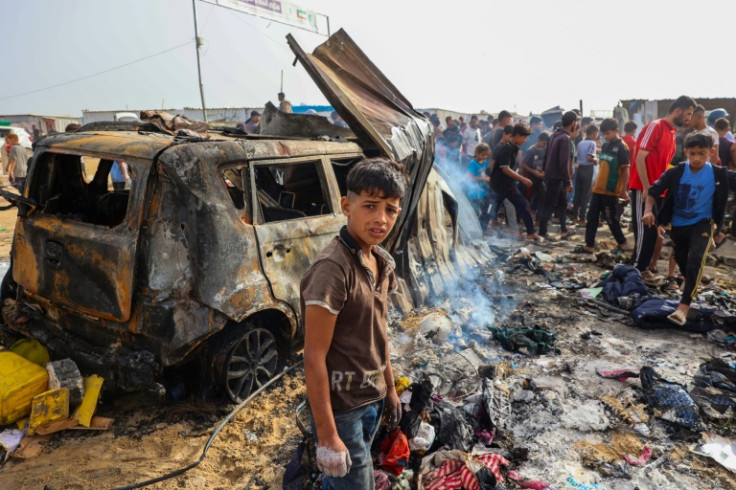
The Hamas militant group said Wednesday it had sent new "ideas" to Qatari mediators aimed at ending the nearly nine-month Gaza war with Israel.
Israel confirmed that it was "evaluating" Hamas "comments" on a deal to free its hostages in the Palestinian territory and would reply.
With the death toll mounting and conditions worsening daily for Gazans, both sides are under increased international pressure to agree to a ceasefire -- more recently based on a roadmap pushed by US President Joe Biden.
Hamas has demanded "a permanent ceasefire and complete withdrawal" of Israeli troops from Gaza.
Israel says there can be no end to hostilities until Hamas releases all hostages taken during the October 7 attacks. Prime Minister Benjamin Netanyahu has also repeatedly vowed that Israel's Gaza campaign will not cease until Hamas's military and governing capabilities are destroyed.
Hamas said Wednesday evening it was communicating with officials from Qatar, Egypt and Turkey with an eye to ending the conflict.
Qatar-based Hamas political chief Ismail Haniyeh "made contact with the mediator brothers in Qatar and Egypt about the ideas that the movement is discussing with them with the aim of reaching an agreement", the group said in a statement.
It added that "communication also took place between the head of the movement and officials in Turkey".
Qatar, working closely with the United States, has led mediation efforts.
"We exchanged some ideas with the mediator brothers with the aim of stopping the aggression against our Palestinian people," an earlier Hamas statement said.
Netanyahu's office and the Mossad intelligence service confirmed the new approach almost straight away.
"The hostages deal mediators have conveyed to the negotiating team Hamas' remarks on the outline of the hostages deal. Israel is evaluating the remarks and will convey its reply to the mediators," said an Israeli statement.
According to a source with knowledge of the talks, "the Qataris, in coordination with the United States, have been engaging with Hamas and Israel over the past weeks in an attempt to bridge the remaining gaps."
Biden said the plan he proposed on May 31 originated with Israel. It includes a six-week ceasefire, a hostage-prisoner exchange and Gaza's reconstruction.
It would be the first truce since a week-long pause in fighting in November that saw more than 100 hostages freed and Palestinians released from Israeli jails.
The war started with the October 7 attack on southern Israel that resulted in the deaths of 1,195 people, mostly civilians, according to an AFP tally based on Israeli figures.
Hamas militants also seized 251 hostages, 116 of whom remain in Gaza including 42 the army says are dead.
Israel's retaliatory offensive has killed at least 37,953 people, also mostly civilians, according to figures from the Hamas-run territory's health ministry.
On top of international criticism, Netanyahu faces intense domestic pressure to secure the release of remaining hostages, as well as having to prepare for potential conflict with Hezbollah on the Lebanon front. He has said military action is the best way to put pressure on Hamas, however.
The New York Times this week quoted Israeli security officials as saying top generals see a truce as the best way to secure the release of remaining hostages, even if Israel's war goals are not all met.
Netanyahu rejected the report and vowed Israel would not give in to the "winds of defeatism".
US Secretary of State Antony Blinken discussed peace efforts last week in Washington with Israeli Defence Minister Yoav Gallant.
While there are signs of tensions between the Israeli prime minister and US president, Netanyahu is to speak to the two houses of the US Congress at a session scheduled for July 24.




